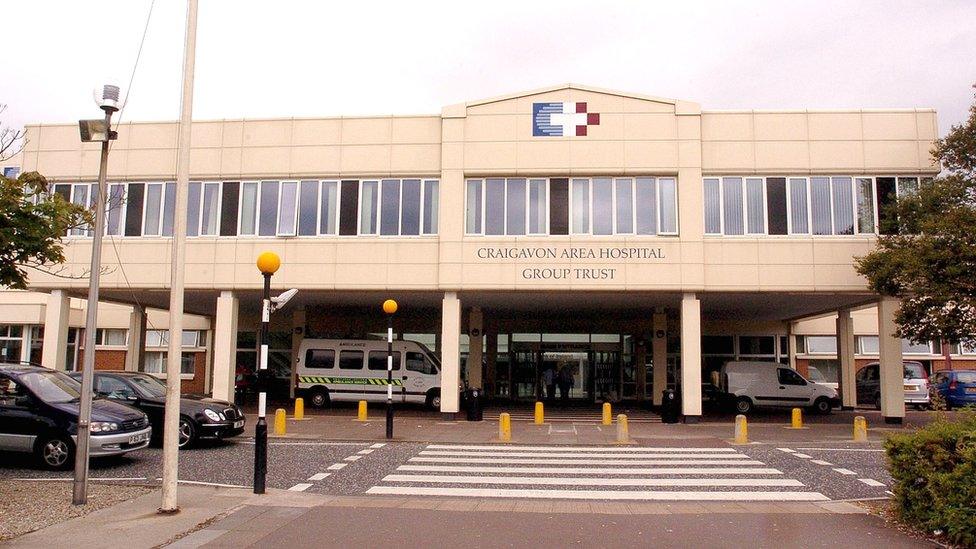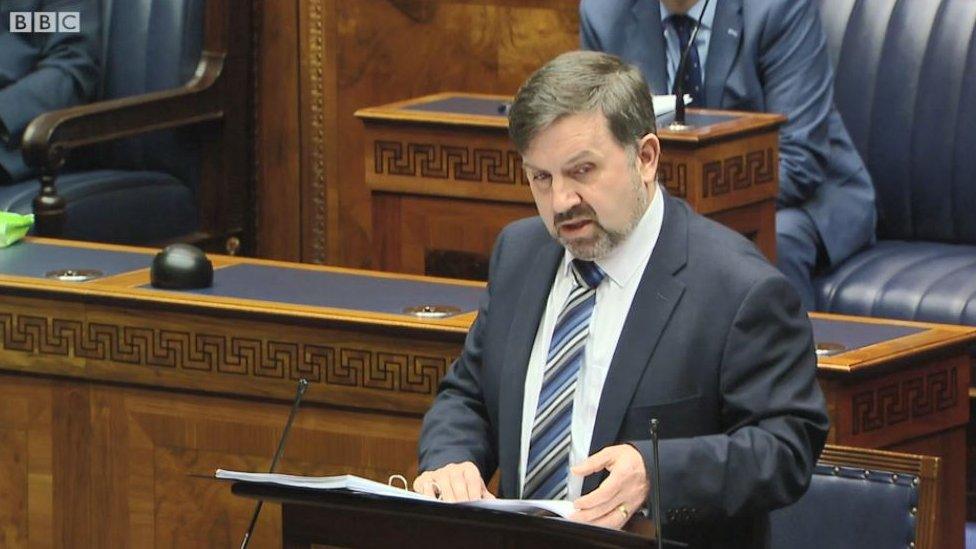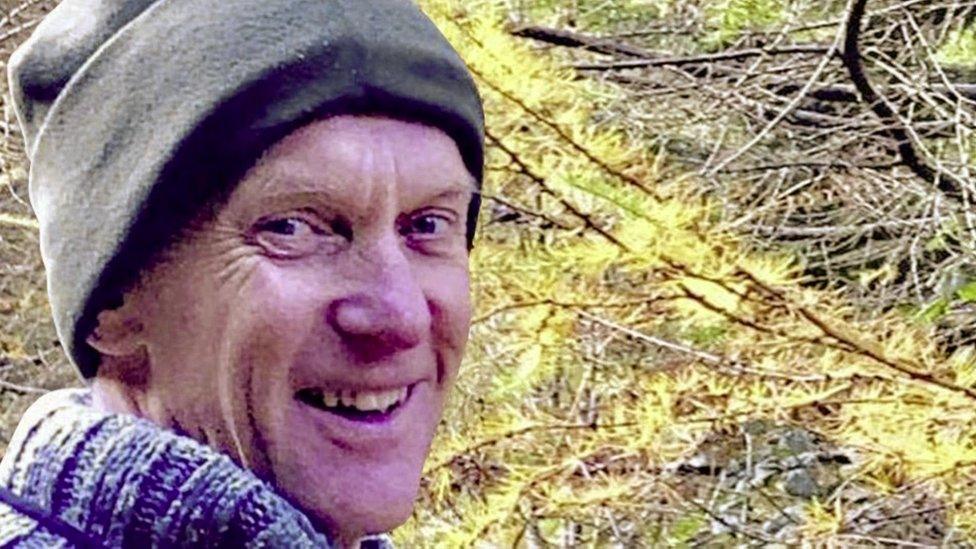Urology public inquiry ordered over consultant Aidan O'Brien
- Published

The inquiry focuses on the work of a consultant urologist at Craigavon Area Hospital
Northern Ireland's health minister has ordered a statutory public inquiry into "serious concerns" about the clinical practice of a hospital consultant.
Robin Swann said that hundreds of families had been contacted by his department as a result of a review into urology consultant Aidan O'Brien.
Over 1,000 patients' records have been recalled at the Southern Health Trust.
The trust said it shared the "high level of concern" and "will be fully co-operating with the Inquiry process".
Preparing for his retirement in June, Mr O'Brien handed over his case files to the health trust.
The BBC understands that it emerged that the treatment of two patients was incomplete - they still required surgery.
On further inspection of cases, other issues emerged which eventually led to an investigation of Mr O'Brien's work between January 2019 and June 2020.
It comes as an independent inquiry into neurologist Dr Michael Watt is upgraded to a public inquiry.
Public inquiries are set up to uncover the truth following scandals or perceived injustices, and have the power to compel people to give testimony, and gather other forms of evidence.
Dr Watt was at the centre of Northern Ireland's biggest ever patient recall.
In 2018, about 3,000 patients were recalled as part of an investigation into his work at Belfast's Royal Victoria Hospital.
'Upset and distress'
Mr Swann "unreservedly" apologised to patients and their families for the "upset and distress caused" by the review into consultant Aidan O'Brien.
Urology, the healthcare area he worked in, deals with the urinary tract in both men and women and male genital organs.
Like other areas of NI's healthcare system, it has extensive waiting lists.
In a statement to the assembly, Mr Swann said that the Southern Trust contacted his department on 31 July, "to report an early alert concerning the clinical practice of this consultant".
The minister said the trust informed his department that it had become aware of potential concerns by 7 June, regarding delays of treatment for surgery patients under the care of the consultant urologist.
The trust had become aware that two out of 10 patients listed for surgery were not on the hospital's patient administration system at that time.

Robin Swann made a statement to the Northern Ireland Assembly
After these issues were raised, a look back at the consultant's work was undertaken, with Mr Swann telling the assembly 1,159 patients' records have initially been reviewed and 271 patients or families have been contacted by the trust.
Mr Swann said nine cases have so far been identified that meet the threshold for a serious adverse incident (SAI) review, while a further six cases are being reviewed in more detail to establish if those patients have come to harm.
Mr Swann said the concerns about clinical practice of the consultant urologist are "of the gravest concern".
The health minister said it would "take some time" before the inquiry began, and the families and patients would have an "opportunity to influence the terms of reference of the inquiry".

Is NI learning lessons?

Within an hour, two public health inquiries were announced and an apology was delivered by the health minister.
It's not often that events move so quickly in Northern Ireland.
Such haste around the urology inquiry signals two things: It is extremely serious, and Robin Swann wants to be seen to be taking the lead.
Both recalls have much in common, centring on the work of two individual consultants and the health and welfare of hundreds of patients.
The General Medical Council - the healthcare regulator for medical professionals - is also involved with both consultants.
And there are questions over the private work that both men were carrying out - in Mr O'Brien's case at his home.
By now, Northern Ireland should be an expert in holding public health inquiries.
While the inquiry into hyponatraemia was one of the longest-running in the UK, those into neurology and the scandal at Muckamore are likely to take years to complete.
While Northern Ireland is gathering experience in this field, one obvious question has to be asked: When do lessons start being learned?

The Southern Trust's Chief Executive Shane Devlin said it was likely more patients would be contacted as reviews of patient notes continue to be carried out.
"I sincerely apologise for the distress and concern this news will cause," he said.
"We have already been in touch with patients/families who we have identified through our urgent review of cases, and invited those who we have clinical concerns about to come for a review appointment so we can be assured that their treatment is appropriate."
'Disturbing'
Colm Gildernew, chairman of the Stormont health committee described the situation as "concerning" but welcomed the announcement of an inquiry.
DUP MLA Jonathan Buckley said it would "no doubt cause concern for patients across the southern trust".
Alliance Party MLA Paula Bradshaw said the common factor connecting the medical scandals related to Muckamore, neurology, hyponatraemia and this are all clinical governance.
"How many times are we going to be brought to this chamber as MLAs to discuss breakdowns in clinical governance?" she asked.

What are NI's other health public inquiries?
Neurology Inquiry, November 2020 Robin Swann announced on Tuesday the Independent Neurological Inquiry would be upgraded to a public inquiry.
It is looking at concerns raised about potential misdiagnoses by neurologist Michael Watt in the Belfast Trust, in which more than 3,000 patients were recalled. The independent inquiry was launched in May 2018.
Muckamore Abbey Hospital, September 2020 A public inquiry into allegations of physical and mental abuse of patients dating back to 2017 was announced in September.
So far 15 people have been arrested in relation to the ill-treatment of patients at the facility, with the most recent arrest taking place on Monday. No one has yet been charged.
Hyponatraemia, November 2004 The 14-year inquiry into the hyponatraemia-related deaths of five children in Northern Ireland's hospitals was the longest running in British history when it reported in January 2018.
Hyponatraemia is a medical condition that occurs when there is a shortage of sodium in the bloodstream, and the inquiry found four out of the five deaths were avoidable.

The minister said he hoped the inquiries would get to the "root cause" of the problems.
Sinn Féin MLA John O'Dowd described the minister's announcements as probably one of the most disturbing he had heard.
He said there was a problem within the "culture" of the health service, and that consultants "have too much power".
Mr Swann said he "unfortunately recognised" what Mr O'Dowd had said.
Read more live updates on the health minister's statement to the assembly here.
- Published26 October 2020

- Published8 October 2020

- Published31 January 2018
